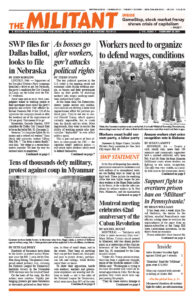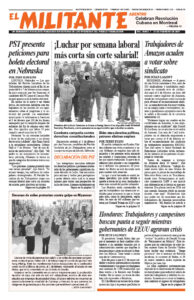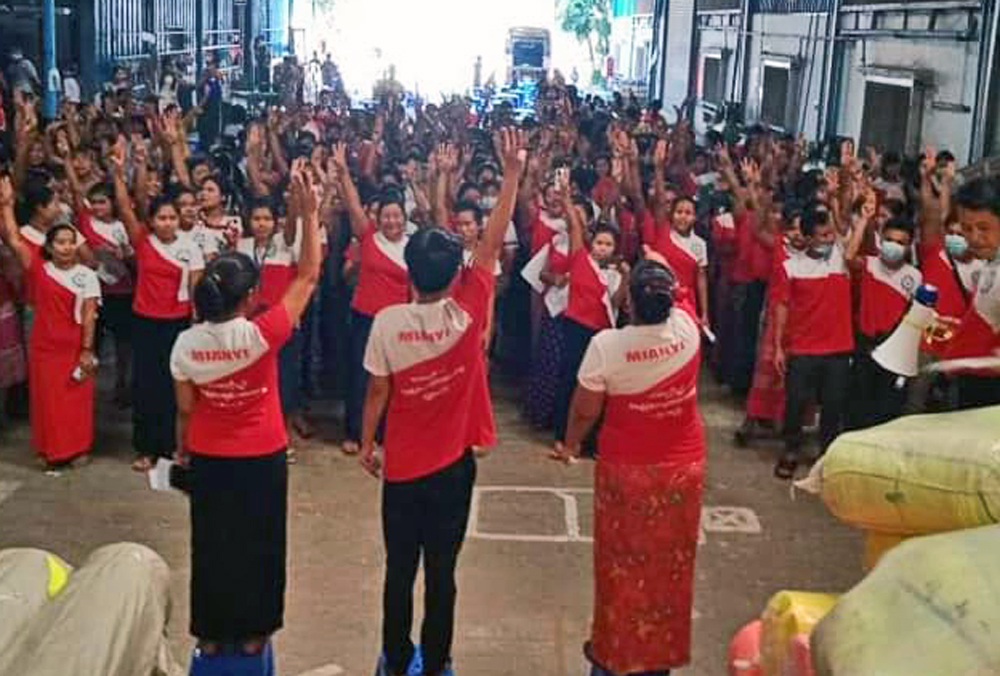Hundreds of thousands have taken to the streets in protest across Myanmar since the Feb. 1 coup led by Gen. Min Aung Hlaing. The generals reimposed naked military rule, claiming the National League for Democracy landslide victory in the November 2020 elections was the result of fraud.
On the heels of the coup, the first actions were cautious. Nightly pot-banging protests got more boisterous as thousands gathered on their balconies, in front of small shops, and in the streets. They bang on anything they can get their hands on, from pots and pans to plastic drums, garbage-can lids and railings, while drivers sound their car horns.
To show their opposition, health care workers, teachers and government employees are wearing red ribbons to work — red is the color of the National League for Democracy, which won more than 80% of the vote in November. Red balloons decorate stalls at public markets. Raising a three-finger salute, a gesture inspired by “The Hunger Games” movies that became a symbol of defiance during protests in neighboring Thailand, is widespread.
The military responded by shutting down the internet and cellphone service. But the protest actions keep growing.
Gaining confidence, tens of thousands of students, government employees, shop owners, garment workers and others took to the streets of Yangon, Mandalay and Naypyitaw, the capital, Feb. 6, including workers from 14 unions. Among the chants: “Let the military dictatorship fall!” “Restore democracy!” and “Abolish the 2008 Constitution.”
That constitution was adopted under previous military rule. It allocates 25% of the seats in parliament to appointment by the generals, gives them control over the key ministries of defense, home affairs and border control, and assures defense of their widespread business interests.
Protesters are demanding the release of all those arrested, including Aung San Suu Kyi, de facto head of the government before the coup and the central leader of the National League for Democracy.
Miners protest coup
Irrawaddy, a newspaper based in Yangon, the country’s largest city, reports that 300 of the 2,000 miners at the Kyisintaung copper mines in the Sagaing Region of northern Myanmar stopped work Feb. 5 to protest the coup. The rest of the miners are wearing red ribbons. The mine is a joint venture between the military-owned Myanmar Economic Holding Public Co. and Chinese-owned Myanmar Yang Tse Copper.
The regime in Beijing is the military’s biggest business partner and international backer.
By Feb. 8 the numbers of protesters had grown to hundreds of thousands from big cities to small towns, including the southern city of Dawei and in Myitkyina, capital of the Katchin State in northern Myanmar. Garment boss Aung Myo Hein told the Wall Street Journal that two-thirds of the 1,200 workers at his factory skipped work, many joining the protests.
The police used water cannons to disperse a protest in Naypyitaw, where the military headquarters is based.
National League for Democracy
The National League for Democracy, a bourgeois party, won elections in 2015, five years after Suu Kyi was released from seven years of house arrest. While a special provision in the 2008 Constitution bars her from running for president, she has been the central government leader since.
Despite tense relations, she and her party have collaborated with the military high command. She left in place colonial-era laws used to prosecute opponents. Despite her campaign pledge to hold peace talks with some 20 armed groups of ethnic insurgents, little progress has resulted. More than 40% of the country’s population belong to ethnic minorities.
Suu Kyi not only refused to criticize the army’s attacks on the Rohingya, a Muslim minority, she has been the regime’s main spokesperson in denying the massacres, abuse and expulsions of hundreds of thousands of Rohingya that began in 2017. The government falsely claims the Rohingya are “illegal” Bangladeshi immigrants, not a minority.
“We used to pray for her success and used to treat her like our queen. But after 2017, we realized her real character,” Mohammad Yunus Arman, a coup opponent and leader of Rohingya refugees at a camp in Bangladesh, told Al Jazeera. “She didn’t even utter the word ‘Rohingya.’”
Since the National League for Democracy took power, the military’s budget has risen by $100 million yearly and its business interests have boomed.
The attacks on minority groups and the decades of military rule is a legacy of British colonialism and the imperialist plunder of the people of Myanmar, long known as Burma, and its resources.
British rulers fostered divisions
In 1886, British forces completed their conquest and annexed Burma to British-ruled India. They expanded rice production, mining and logging, distorting the economy for foreign trade to enrich the British capitalist rulers at the expense of workers and peasants. The British rulers fostered ethnic and religious divisions in a nation where over 100 languages are spoken.
During World War II, the country was conquered by Tokyo and then reconquered by the British, with supporters of independence allying themselves first with the Japanese military and then switching over to the British-backed colonial army.
In the midst of the worldwide rise in anti-colonial struggles after the war, the British rulers agreed to Burmese independence. But instead of working to overcome the divisive legacy of British colonial rule, the independence leadership favored the ethnic Burman majority.
From 1962 until 2011 Myanmar was ruled by a series of military juntas. A 1988 uprising against military rule was crushed in blood with 3,000 killed and thousands imprisoned. Protests initiated by Buddhist monks in 2007 were brutally suppressed.
Over the last decade, Myanmar became a major center for world garment production with more than 600,000 workers. The minimum wage in Myanmar is roughly half that of Cambodia and Vietnam, boosting profit margins for bosses who set up operations there. Over half of the garment shops have been owned by bosses based in China.
Firms based in China also have stakes in at least 34 major projects from gold mines to hydropower, including joint ventures with Myanmar military-owned companies. Beijing had also courted Suu Kyi and her allies.


